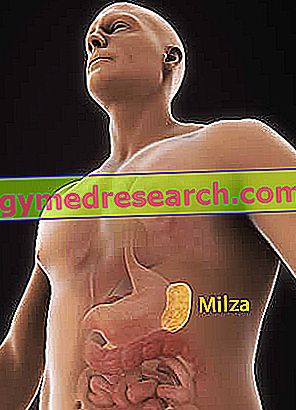Generality
Depression is a disorder that can have important repercussions on the lives of people who suffer from it. In some cases, this condition makes it difficult to study or work, maintain emotional and social relationships, feel interest or pleasure in normal daily activities.

Unfortunately, people who suffer from depression rarely recognize the symptoms and do not seek medical attention. In reality, this disease can be tackled and overcome .
The treatment is personalized : what is effective for one person may not work for another. The therapeutic path to get out of the depression must therefore be established with the help of a specialist doctor, in relation to the characteristics of the individual and of the illness.
What's this
Depression (also called major depressive disorder) is a condition characterized by a series of symptoms that occur simultaneously, for a certain interval of time. These manifestations interfere significantly with daily life and cause significant distress in the person who suffers from it.
The "spies" of depression can be many, but generally they include:
- Persistent sadness and / or very strong lowering of mood;
- Little desire to do and loss of interest in normal things (eg work, social life or relationships);
- Inability to experience pleasure (anhedonia);
- Changes in biological rhythms (such as, for example, sleeping badly and struggling to "carburize" in the morning);
- Difficulty concentrating, loss of memory and other disorders of cognitive faculties.
Physical and somatic disturbances such as headaches, lack of energy and myalgia are also an alarm bell. To talk about depression, it is necessary that the symptoms are present all day and last for at least two weeks.
Causes
To understand how to get out of depression, it is necessary to know that, even today, the mechanisms underlying this complex disease are not fully known.
However, in recent years, some aspects have been clarified and it seems that the disturbance can be caused by the interaction of several triggering elements.
In particular, it seems they can intervene:
- Biological factors : depression appears to be essentially due to biological changes that affect the brain's functions. These have not yet been fully clarified, but the dysfunction of some neurotransmitters, substances that allow the normal transmission of nerve impulses, could be implicated. In fact, these play an important role in the mechanisms that regulate mood, the relationship with the outside world and the ability to react to emotional stimuli.
- Genetic factors : some people have a basic predisposition to develop depression. In some cases, this increased susceptibility is genetically determined and is hereditary: this is demonstrated by the fact that often more members of the same family develop depression.
- Psychosocial factors : depression can occur without an apparent reason; often, however, the first episode is triggered by external circumstances and can be associated with a negative triggering event, such as painful and stressful past experiences, disappointments and relationships with friends or family who are not satisfying. Certain character and psychological traits of the subject can also predispose to depression. In particular, introverted and timid subjects are vulnerable or those who enter into crisis easily in case of tension or suffer from interpersonal dependence.
- Environmental factors : in some people prone to depression, they manifest symptoms only if they experience some situations in the course of life. For example, the discrepancy between natural and social rhythms increases the chances of getting sick. Likewise, poorly fulfilled relationships or unsatisfactory work are involved. Other predisposing factors are insufficient rest, poor exposure to sunlight and abuse of alcohol and drugs.
Symptoms, signs and complications
To get out of depression, it is essential to recognize the symptoms to get a diagnosis as early as possible and start an effective therapeutic pathway.
The disease is announced, in particular, by a series of signals that occur simultaneously, for a certain interval of time, and represent a change from the previous level of functioning.
The criteria for the diagnosis of depression
In order to talk about depression, the doctor must submit the patient to a complete examination, with the aim of identifying the presence of at least five or more of the following symptoms:
- Persistent sadness, anxiety and feeling of emptiness;
- Despair and totally pessimistic view of life;
- Feelings of self-depreciation or excessive, continuous or inappropriate feelings of guilt;
- Marked decrease in interest or pleasure in performing usual activities that were previously satisfying or rewarding;
- Lack or excess of energy, constant feeling of fatigue or, on the contrary, of agitation;
- Significant increase or loss of weight completely independent of the will of the person (or decrease or increase in appetite);
- Sleep disorders (hypersomnia, insomnia or frequent awakenings during the night);
- Feeling of being "slowed down" and difficulty in being able to concentrate, remember or make decisions;
- Continuous pain or other persistent physical symptoms, not caused by physical illness or injury;
- Thoughts of recurrent death, ideation or attempted suicide.
At least one of the symptoms must be a depressed mood or loss of interest or pleasure . Important elements to watch out for are the recurrence and duration of symptoms, which must occur for most of the day, almost every day, and for at least two weeks .
Common elements
To get out of depression, you need to know that this disease can manifest itself with different levels of severity . Some people have symptoms of low intensity, related to particular moments in life; others feel so depressed that they cannot perform normal daily activities.
The various forms of depression, although they may present themselves differently, share some features:
- Almost always, the first depressive episode is triggered by an easily identifiable event, perceived by the person as an important and unacceptable loss; the subsequent fallout may appear, instead, without an apparent trigger .
- Symptoms cause clinically significant distress or functional impairment in important contexts of daily life (social, work, emotional, family, etc.).
- Depressive episodes last for at least two weeks, manifesting themselves with a series of symptoms that cannot be linked to other causes (such as hormonal dysfunction, hypothyroidism or pharmacological treatment).
Diagnosis
Getting out of depression is possible: just recognize the problem and deal with it with medical support. The average time to reach the diagnosis of depression is very high: an average of two years is estimated between the onset of the first symptoms and the beginning of therapies.
The late decision to consult a doctor negatively affects the manifestations, the efficacy of the treatments and the recovery from the illness.
Therapy
Depression is a complex disorder that does not always present itself clearly and can be associated with other diseases. For this reason, the therapy is highly personalized and requires a small dose of patience : before finding the most effective strategies to get out of depression, even more attempts may be necessary.
First of all, it is important to follow the treatment times and methods indicated by the general practitioner or psychiatrist, depending on the different needs or the seriousness of the pathology. If the indications are not followed in the right way, in fact, it is likely that the therapeutic path to get out of the depression does not work or relapses occur for the exacerbation of symptoms or re-exposure to risk factors.
Psychotherapy
In milder forms, only psychotherapy may be indicated to overcome depression in order to resolve or reduce the symptoms of the disease.
Some of the possible interventions are:
- Cognitive behavioral therapy : this treatment is based on a series of individual interviews. The aim is to help the person to adopt new points of view, encouraging them to minimize and solve their problems. In addition, cognitive-behavioral psychotherapy intervenes by changing expectations about oneself and helps to identify negative and dysfunctional ways of thinking. This allows the patient to become aware of the vicious circles that maintain and aggravate the disease. Finally, the doctor encourages the subject to engage in pleasurable and rewarding activities. At the end of the course, it is important to set up a maintenance therapy, which intervenes on the strategies useful to avoid relapses.
- Psycho-education : family members and patients are informed about the pathology, in order to create a common knowledge that helps people to follow the treatment. In the process of getting out of depression, it is essential to have a welcoming and understanding family next to each other, which does not stimulate feelings of shame, but which supports all phases of the disease. Since the relapses are easy, the people who are next to the subject are also "educated" to recognize the symptoms that herald a new depressive episode.
- Interpersonal therapy : it seems to be effective, especially when it is used in synergy with drug treatment. The goal is to strengthen the social network of the depressed person, helping them to get out of social isolation and overcome unsolved problems.
drugs
To get out of the medium-severe forms of depression, psychotherapy is almost always associated with a pharmacological treatment.
Considering also the biological bases of the disease, it is necessary to establish a therapeutic protocol that acts in this sense. In fact, the most widely used drugs are antidepressants that work by modulating the action of neurotransmitters. The most suitable therapy for the specific case is prescribed by the psychiatrist: it is necessary to remember that depression is not the same for everyone and it is fundamental to frame the discomfort as precisely as possible, so as to be able to adequately calibrate the active ingredient to be used, the dosage, timing and methods of administration.
As for antidepressants, they are mainly used:
- Selective serotonin reuptake inhibitors (SSRIs) : ex. fluoxetine, paroxetine, sertraline and escitalopram;
- Serotonin-norepinephrine reuptake inhibitors (SNRIs) : ex. duloxetine and venlafaxine;
- Norepinephrine and dopamine reuptake inhibitors (NDRI) : eg bupropion;
- Tricyclic antidepressants : ex. imipramine, nortriptyline and amitriptyline;
- Monoamine oxidase inhibitors - MAO : ex. tranylcypromine, phenelzine and isocarboxazide.
Other medicines used for depression are:
- Mood stabilizers : they regulate the tone, trying to stabilize it over time;
- Antipsychotics : act against manic symptoms;
- Anxiolytics-hypnotics : attenuate anxiety and anxiety.
Alternative therapies
In association with pharmacological treatment and psychotherapy, to get out of depression, the doctor may also recommend the use of other methods, such as:
- Relaxation techniques : they are especially useful when depression is also associated with anxiety symptoms. During the session guided fantasies are used, evocation of pleasant images and control of breathing;
- Light therapy : consists in the exposure for 30 minutes a day, for a couple of weeks, to a special lamp that supplies precise light stimuli. The treatment intervenes by balancing the levels of melatonin and serotonin, two hormones involved in the development of depression. "Light therapy" must always be prescribed by the specialist and can be performed in hospitals or specialized centers. On the market, there are also lamps for home use.
- Phytotherapy : an aid to counteract anxiety, insomnia and depression, it can be represented by natural medicine. Also in this case, the doctor can advise the most appropriate remedy for the characteristics and conditions of the person. In the presence of depression, St. John's wort (or St. John's wort) and Rhodiola can lift the mood. Other particularly useful remedies are Passiflora and Valeriana (sedatives), Chamomile, Hawthorn and Melissa (soothe abdominal or muscular spasms associated with agitation), Bitter Orange and Linden (promote relaxation).
Some advice
To feel better and reduce the risk of falling back into depression, it is important to follow a healthy lifestyle .
In particular, it is advisable:
- Follow a balanced diet, avoiding foods that contain exciting (no excess caffeine, teine or chocolate) or too much fat and sugar;
- Limit alcohol and drug use: they have negative effects on the central nervous system and mental functions;
- Practice regular physical activity, with at least 40-60 minutes of healthy movement, 3-4 times a week;
- Sleep enough hours and try not to lose too much sleep;
- Do not underestimate the main alarm bells, such as loss of interest or pleasure for normal daily activities;
- Try not to isolate yourself, staying in touch with family members and with your network of friends;
- Don't make important decisions at a time when you feel particularly demoralized.



